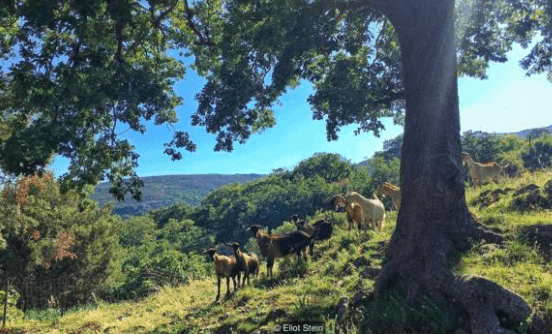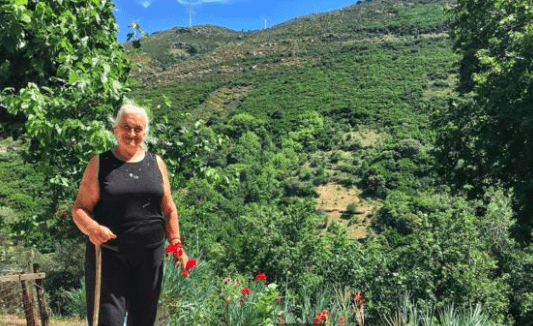BBC media has spotlighted Greece’s remote village of Antia, on the island of Evia, where for over 2,500 years, residents of this beautiful mountainous village have used a language of “sfyria” that only they understand. It is a mysterious form of long-distance communication in which entire conversations can be whistled, no matter how complex. But there are now only six people left who can ‘speak’ it.

Today there are as many as 70 other whistled languages worldwide, and they all exist in remote mountain villages. Yet, not only is sfyria believed to be older and more structured than many other whistled languages, it’s also the most critically endangered. According to Unesco, no other European language – whistled or not – has fewer living speakers than sfyria.
BBC’s journalist Eliot Stein was invited by a local from the village of Antia to experience first-hand how the language is communicated.

Here is an excerpt of the article-
“Hidden deep in the south-east corner of the Greek island of Evia, above a twisting maze of ravines that tumbles toward the Aegean Sea, the tiny village of Antia clings to the slopes of Mount Ochi. There are no hotels or restaurants within 40km, and the hamlet is so remote that it doesn’t exist on Google Maps.
But as you travel here along a dizzying road from Karystos, through a mythical landscape of megalithic ‘dragon house’ stone tombs and giant Cyclopic boulders, you’ll hear an ancient siren song reverberating against the mountain walls. That’s because, for thousands of years, the inhabitants of Antia have used a remarkable whistled language that resembles the sounds of birds to communicate across the distant valleys.
Known as sfyria, it’s one of the rarest and most endangered languages worldwide – a mysterious form of long-distance communication in which entire conversations, no matter how complex, can be whistled. For the last two millennia, the only people who have been able to sound and understand sfyria’s secret notes are the shepherds and farmers from this hillside hamlet. Each of them has proudly passed down the tightly guarded tradition to their children.
But in the last few decades, Antia’s population has dwindled from 250 to 37, and as older whistlers lose their teeth, many can no longer sound sfyria’s sharp notes. Today, there are only six people left on the planet who can still ‘speak’ this unspoken language –
No one can recall exactly how or when the villagers here began using sfyria – from the Greek word sfyrizo, meaning ‘whistle’ – to communicate. Some residents speculate it came from Persian soldiers who sought refuge in the mountains some 2,500 years ago.
Others claim the language developed during Byzantine times as a secret way to warn against danger from rival villages and invading pirates. There’s even a belief that in ancient Athens, they’d post whistlers from Antia on the mountaintops as sentries so they could signal an imminent attack on the empire.

Remarkably, sfyria was only discovered by the outside world in 1969, when an aeroplane crashed in the mountains behind Antia. As the search crew went out to look for the missing pilot, they heard shepherds volleying a series of trilled scales back and forth across the canyons and became enchanted by their cryptic code.
Today there are as many as 70 other whistled languages worldwide, and they all exist in remote mountain villages like Antia. After all, it’s easier to purse your lips than to scramble up and down the mountainsides whenever you want to invite your neighbours over for a glass of ouzo.
Yet, not only is sfyria believed to be older and more structured than many other whistled languages, it’s also the most critically endangered. In fact, according to the Unesco Atlas of the World’s Languages in Danger, no different language in Europe – whistled or not – has fewer living speakers than sfyria.
“When I was a child, we had to learn sfyria with Greek to survive,” said Panagiotis Tzanavaris, a soft-spoken 69-year-old and Antia’s best whistler. “It’s our way of life, and if it disappears, so does the cultural identity of this village.”
So, in 2010, Tzanavaris set out on a quest to resuscitate the dying language, establishing the Cultural Organisation of Antia in the village’s closed-down, one-room schoolhouse.
Three years ago, he welcomed a team of linguists from Harvard and Yale universities to come to record the whistlers’ notes for future generations. Last year, he and Apostolou were featured in a documentary screened at New York’s Metropolitan Museum of Art. And most recently, he kindly invited me to Antia.
Tzanavaris has also been doing something previously unheard of with his village’s tightly guarded tradition: teaching someone from another town how to whistle sfyria. After seven years of lessons, the youngest speaker of Antia’s ancient language is now a 31-year-old courier who lives 40km away in Karystos.
“For years, the people in Antia have been talking about a disappearing language,” Tzanavaris told me. “But with your help, we may start talking about a language that survived.”
*Read the article in full here-
bbc.com/travel/story/20170731-greeces-disappearing-whistled-language?tblang=english
*Image credit- Eliot Stein

